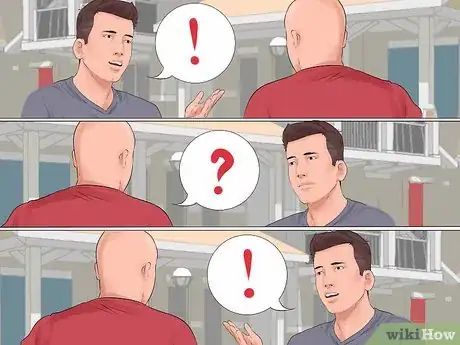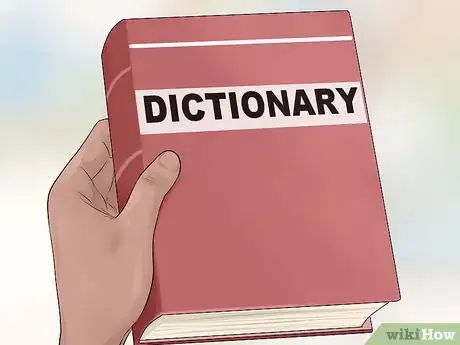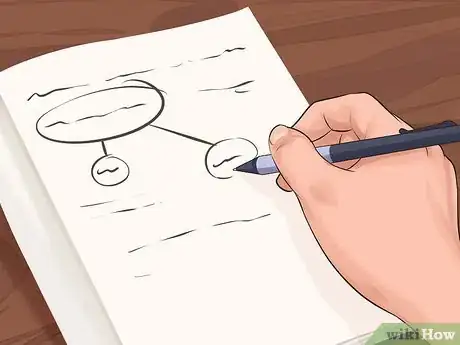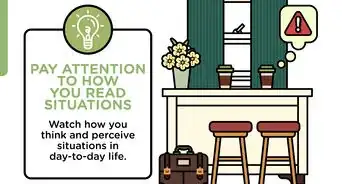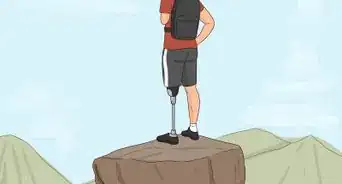This article was co-authored by Erin Conlon, PCC, JD. Erin Conlon is an Executive Life Coach, the Founder of Erin Conlon Coaching, and the host of the podcast "This is Not Advice." She specializes in aiding leaders and executives to thrive in their career and personal lives. In addition to her private coaching practice, she teaches and trains coaches and develops and revises training materials to be more diverse, equitable, and inclusive. She holds a BA in Communications and History and a JD from The University of Michigan. Erin is a Professional Certified Coach with The International Coaching Federation.
There are 14 references cited in this article, which can be found at the bottom of the page.
This article has been viewed 81,643 times.
In the 21st century, there are endless ways to access information that can help widen your knowledge and logic, and it all begins with learning. The more you learn, the more you understand. The more you understand, the easier it is to learn new things. Knowledge and logic is something everyone can gain overtime through continuous learning and effective practices.
Steps
Improving Your Reasoning
-
1Don't practice ad hominem. Ad hominem attacks happen by placing doubt on someone's character or attributes to discredit their arguments. When someone does this, they are undermining someone's case without providing logical evidence as to why. It is important to listen to information and disconnect it from feelings you may have for that person. This will allow you to pull out the facts and stay logical.[1]
-
2Avoid appealing to emotion. Emotional appeals are often used in order to get a reader or listener to respond out of sympathy and it can lead someone to act against their better judgment. Be sure to watch out for these types of manipulations and to keep a clear head.[2]Advertisement
-
3Don't always hop on the "bandwagon." It is very common for someone to agree with an idea or opinion merely because it is a popular one. When deciding your own thoughts, views, or opinions on a particular issue, be sure you know why you feel a certain way. Do not just agree to something because everyone else is going along. Always back your opinions up with your own personal logic and research.[3]
-
4Beware of circular reasoning. This is a pragmatic defect in an argument in which the end result ends up being the starting point. Basically, the proposition for something is supported by the premises, and the premises are supported by the proposition. The argument fails to have valid evidence because the foundation for proof does not have real evidence.[4] Here is a common example:
- Person A, "Go to bed."
- Person B, "Why?"
- Person A, "Because I said to go to bed."
Listening to Influential Voices
-
1Watch TED talks. TED talks are thought-provoking lectures put on by a wide range of people who talk about ideas in science, psychology, humanity, anatomy, or anything that has sparked human curiosity. These talks are of the highest quality and will surely spark your mind to think critically and open up to new ideas.[5]
- TED talks can be found on their website or app, DVDs, or on YouTube.
-
2Attend seminars and conferences. Professional workshops are lead by people who have a vast amount of knowledge about a specific field, theory, or idea and want to share that information with other curious minds. You can attend professional workshops catered to helping you grow in your career, or workshops that help you in your everyday life.[6]
- Professional workshops can be found by online research or by asking about opportunities at work.
-
3Follow people who are well-established in their field. Depending on what your interests are, find out who the influential leaders were/are in that area and learn about them. Read about their accomplishments, or watch documentaries about their life. This will teach you about how people pursued great things and may inspire and teach you to do the same.
- Take a deep dive into a single subject so you can learn about the nuances of it.[7]
-
4Take a massive open online course. MOOC's are universal online courses that are available for anyone to take part in for free. They are offered by top universities and organizations in order to create a learning community. It provides you the opportunity to learn from the top minds in the world. There are many free online courses and lectures you can take advantage of.[8]
-
5Listen to podcasts. Podcasts are audio digital media that you can download off the internet. They are available on numerous subjects and topics and are often hosted by individuals that have a great amount of knowledge or expertise in a specific area.
- The Nerdist is a great source for podcasts on the latest scientific discoveries and thought-provoking topics designed to get you thinking.
- NPR offers many podcasts that cover news from around the world.[11]
- The University of Oxford has a huge collection of podcasts and online lectures available.[12]
Reading from a Variety of Sources
-
1Read as much as you can. Reading truly is the gateway to knowledge, and there is a vast array of reading materials to choose from.[13] Whether you choose to read classic literature, the newspaper, online articles, medical journals, or magazines, you will be learning new knowledge. Reading not only helps you learn about the world, but it will also strengthen your vocabulary. While there are endless places to browse, here are several places to start:[14]
- The BBC website or app and The Guardian are large-scale news sources.[15]
- The Wall Street Journal and New York Times are reliable newspapers.
- Time, The Atlantic, and The Economist are informational magazines.
- The Bloggies is an award-winning site where you can find blogs in a variety of categories.[16]
-
2Increase your vocabulary through reading. Reading is a great way to introduce yourself to new words. Once you come across a word you are unfamiliar with, use a dictionary to look it up its meaning. After you learn what the new word means, try to use it in conversations you have with people, or in things you write, such as a journal.[17]
- If you hear a word throughout the day that you don't know, write it down so you can look it up later.
-
3Check multiple sources. When reading about a specific subject, be sure to refer to many different sources so that you can learn multiple perspectives. Often times, literature or news sources can be biased, or only present one side of an issue. In order to stay logical, and learn the full story or idea, it is important to research an issue from several different sources.
-
4Browse encyclopedias. This can be an easy way to come across some unknown thing that captures your interest and leads to further exploration, discovery, and knowledge. An on-line encyclopedia is direct and fast, but it virtually eliminates the possibility of discovering those interesting unknowns that you would stumble upon in a hard copy encyclopedia.[18]
-
5Search the internet. The internet is full of quizzes, articles, and endless information sources that you can search for in seconds. If you have a computer with internet capability at home, then you have a wealth of knowledge at your fingertips.[19]
- Beware of online sources that contain false information. Always check the sources online sites use to gather their information to make sure it is a reputable source.
Practicing Daily Habits
-
1Write and take notes. Writing things down allows you to remember better than just hearing it or saying it. When you read, it helps you learn information, and then writing it down helps you to retain it. Just as you practiced in school, writing down information helps to reinforce information.[20]
-
2Have informal conversations and discussions. These types of interactions with other people tend to stay retained in your mind better than information learned through studying alone or just listening. You never know what wisdom a person may have until you listen to what they have to say.[21]
- Be open-minded to the ideas of those around you. Everyone will have a different interpretation or opinion on something, and in order for you to think critically, it is important to listen to all of those ideas.[22]
-
3Think critically. This means to be skeptical and perform your own research. You don't have to accept everything you hear as truth or fact. You should deeply question and ponder the validity of all that you hear in order to truly widen your logic and knowledge. Whether it's reading, researching, or participating, you must actively engage, be willing to explore, ask questions, and really think about what you're doing. Allow your mind to mull over everything you learn and experience so it can grow. This is how new information becomes actual knowledge.
-
4Practice puzzles. Puzzles that are designed to get your mind thinking. Sudoku, logic puzzles, or chess are great exercises for your brain. Working through puzzles can help you develop logical thinking. Every kind of puzzle has its own set of rules, procedures, and tricks for figuring it out. Mastering each set of rules and tricks improves your mental agility, which can then be used for other intellectual tasks. In other words, mastering one kind of problem helps you learn to master others.
- At first they may be challenging, but you will find yourself getting better at them the more you practice.
-
5Stay focused. Noise and distractions can short circuit people's mental focus when they're reading, analyzing, or doing other knowledge-building tasks. When you are trying to learn something new, do it in a quiet environment and limit possible distractions.
-
6Keep trying. If you have trouble understanding a difficult subject, keep learning it and do not give up. As long as you stay determined, diligent, and focused, you will increase your knowledge on the subject. Always remember that learning is a life-long process.
Expert Q&A
-
QuestionHow can I increase my daily knowledge?
 Erin Conlon, PCC, JDErin Conlon is an Executive Life Coach, the Founder of Erin Conlon Coaching, and the host of the podcast "This is Not Advice." She specializes in aiding leaders and executives to thrive in their career and personal lives. In addition to her private coaching practice, she teaches and trains coaches and develops and revises training materials to be more diverse, equitable, and inclusive. She holds a BA in Communications and History and a JD from The University of Michigan. Erin is a Professional Certified Coach with The International Coaching Federation.
Erin Conlon, PCC, JDErin Conlon is an Executive Life Coach, the Founder of Erin Conlon Coaching, and the host of the podcast "This is Not Advice." She specializes in aiding leaders and executives to thrive in their career and personal lives. In addition to her private coaching practice, she teaches and trains coaches and develops and revises training materials to be more diverse, equitable, and inclusive. She holds a BA in Communications and History and a JD from The University of Michigan. Erin is a Professional Certified Coach with The International Coaching Federation.
Executive Life Coach Well, try reading as much books as you can. If you're not a good reader, try listening to audiobooks.
Well, try reading as much books as you can. If you're not a good reader, try listening to audiobooks. -
QuestionHow can I increase my knowledge power?
 Erin Conlon, PCC, JDErin Conlon is an Executive Life Coach, the Founder of Erin Conlon Coaching, and the host of the podcast "This is Not Advice." She specializes in aiding leaders and executives to thrive in their career and personal lives. In addition to her private coaching practice, she teaches and trains coaches and develops and revises training materials to be more diverse, equitable, and inclusive. She holds a BA in Communications and History and a JD from The University of Michigan. Erin is a Professional Certified Coach with The International Coaching Federation.
Erin Conlon, PCC, JDErin Conlon is an Executive Life Coach, the Founder of Erin Conlon Coaching, and the host of the podcast "This is Not Advice." She specializes in aiding leaders and executives to thrive in their career and personal lives. In addition to her private coaching practice, she teaches and trains coaches and develops and revises training materials to be more diverse, equitable, and inclusive. She holds a BA in Communications and History and a JD from The University of Michigan. Erin is a Professional Certified Coach with The International Coaching Federation.
Executive Life Coach If you want to grow intellectually, you have to look for nuance, not answers. To do that, try focusing your studies on one subject at a time.
If you want to grow intellectually, you have to look for nuance, not answers. To do that, try focusing your studies on one subject at a time.
References
- ↑ https://yourlogicalfallacyis.com/ad-hominem
- ↑ http://www.webpages.uidaho.edu/eng207-td/Logic%20and%20Analysis/most_common_logical_fallacies.htm
- ↑ http://www.webpages.uidaho.edu/eng207-td/Logic%20and%20Analysis/most_common_logical_fallacies.htm
- ↑ https://web.cn.edu/kwheeler/fallacies_list.html
- ↑ https://www.aaronline.com/increase-knowledge/
- ↑ http://www.magforliving.com/6-easy-ways-to-improve-your-general-knowledge/
- ↑ Erin Conlon, PCC, JD. Executive Life Coach. Expert Interview. 31 August 2021.
- ↑ https://www.mooc-list.com/
- ↑ http://online-learning.harvard.edu/
- ↑ http://online.stanford.edu/courses.
- ↑ http://www.npr.org/podcasts/
- ↑ http://www.ox.ac.uk/
- ↑ Erin Conlon, PCC, JD. Executive Life Coach. Expert Interview. 31 August 2021.
- ↑ http://www.magforliving.com/6-easy-ways-to-improve-your-general-knowledge/
- ↑ http://www.bbc.com/
- ↑ http://2015.bloggi.es/
- ↑ http://www.enhancemyvocabulary.com/improve-expand-vocabulary.html
- ↑ http://www.magforliving.com/6-easy-ways-to-improve-your-general-knowledge/
- ↑ https://www.aaronline.com/increase-knowledge/
- ↑ http://www.magforliving.com/6-easy-ways-to-improve-your-general-knowledge/
- ↑ http://www.magforliving.com/6-easy-ways-to-improve-your-general-knowledge/
- ↑ Erin Conlon, PCC, JD. Executive Life Coach. Expert Interview. 31 August 2021.



